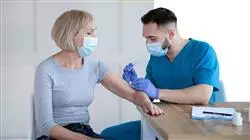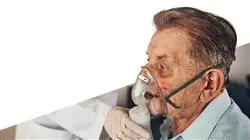University certificate
The world's largest faculty of nursing”
Introduction to the Program
The current healthcare situation has transformed numerous hospital nursing procedures and this program will allow you to catch up in an efficient and flexible way, thanks to its 100% online learning methodology"

In recent years, the essential role played by hospital nurses in the healthcare system has been demonstrated. Thus, this area has not only grown enormously, requiring more and more specialized professionals, but it has also been transforming itself to respond to the challenges that have arisen. Therefore, this situation has forced nurses to update their knowledge, techniques and the most advanced tools with which to work on a daily basis.
As a solution to this circumstance, TECH has designed this Postgraduate diploma in Diagnostic, Therapeutic and Assistance Processes for Nursing, with which the professional will have the latest developments in issues such as surgical procedures and care, diagnostic processes in the hospital environment, work in units of multi-pathological patients, the rational use of medication and diagnostic tests or urgent care processes.
The nurses will have at their disposal numerous multimedia materials, such as analysis of real clinical cases, master classes, interactive summaries or video procedures. And they will be accompanied by a teaching staff made up of active professionals, who will transfer the best content through a flexible and effective online methodology.
This program has the most complete syllabus and the best teaching methodology on the market: everything has been prepared so that you only have to worry about studying”
This Postgraduate diploma in Diagnostic, Therapeutic and Assistance Processes for Nursing contains the most complete and up-to-date scientific program on the market. Its most notable features are:
- The development of case studies presented by experts in Hospital Nursing
- The graphic, schematic, and eminently practical contents with which they are created, provide scientific and practical information on the disciplines that are essential for professional practice
- Practical exercises where the self-assessment process can be carried out to improve learning
- Its special emphasis on innovative methodologies
- Theoretical lessons, questions to the expert, debate forums on controversial topics, and individual reflection assignments
- Access to content from any fixed or portable device with an Internet connection
Improve your professional perspective thanks to this Postgraduate Diploma, with which you will acquire the necessary knowledge to adapt to the current healthcare situation”
The program’s teaching staff includes professionals from the sector who contribute their work experience to this training program, as well as renowned specialists from leading societies and prestigious universities.
The multimedia content, developed with the latest educational technology, will provide the professional with situated and contextual learning, i.e., a simulated environment that will provide immersive training programmed to train in real situations.
This program is designed around Problem-Based Learning, whereby the professional must try to solve the different professional practice situations that arise during the academic year. For this purpose, the student will be assisted by an innovative interactive video system created by renowned and experienced experts.
Apply the most up-to-date care to multi-pathological patients thanks to this Postgraduate diploma"

Learn about the latest developments in critical care processes from great working professionals"
Why study at TECH?
TECH is the world’s largest online university. With an impressive catalog of more than 14,000 university programs available in 11 languages, it is positioned as a leader in employability, with a 99% job placement rate. In addition, it relies on an enormous faculty of more than 6,000 professors of the highest international renown.

Study at the world's largest online university and guarantee your professional success. The future starts at TECH”
The world’s best online university according to FORBES
The prestigious Forbes magazine, specialized in business and finance, has highlighted TECH as “the world's best online university” This is what they have recently stated in an article in their digital edition in which they echo the success story of this institution, “thanks to the academic offer it provides, the selection of its teaching staff, and an innovative learning method aimed at educating the professionals of the future”
A revolutionary study method, a cutting-edge faculty and a practical focus: the key to TECH's success.
The most complete study plans on the university scene
TECH offers the most complete study plans on the university scene, with syllabuses that cover fundamental concepts and, at the same time, the main scientific advances in their specific scientific areas. In addition, these programs are continuously being updated to guarantee students the academic vanguard and the most in-demand professional skills. In this way, the university's qualifications provide its graduates with a significant advantage to propel their careers to success.
TECH offers the most comprehensive and intensive study plans on the current university scene.
A world-class teaching staff
TECH's teaching staff is made up of more than 6,000 professors with the highest international recognition. Professors, researchers and top executives of multinational companies, including Isaiah Covington, performance coach of the Boston Celtics; Magda Romanska, principal investigator at Harvard MetaLAB; Ignacio Wistumba, chairman of the department of translational molecular pathology at MD Anderson Cancer Center; and D.W. Pine, creative director of TIME magazine, among others.
Internationally renowned experts, specialized in different branches of Health, Technology, Communication and Business, form part of the TECH faculty.
A unique learning method
TECH is the first university to use Relearning in all its programs. It is the best online learning methodology, accredited with international teaching quality certifications, provided by prestigious educational agencies. In addition, this disruptive educational model is complemented with the “Case Method”, thereby setting up a unique online teaching strategy. Innovative teaching resources are also implemented, including detailed videos, infographics and interactive summaries.
TECH combines Relearning and the Case Method in all its university programs to guarantee excellent theoretical and practical learning, studying whenever and wherever you want.
The world's largest online university
TECH is the world’s largest online university. We are the largest educational institution, with the best and widest online educational catalog, one hundred percent online and covering the vast majority of areas of knowledge. We offer a large selection of our own degrees and accredited online undergraduate and postgraduate degrees. In total, more than 14,000 university degrees, in eleven different languages, make us the largest educational largest in the world.
TECH has the world's most extensive catalog of academic and official programs, available in more than 11 languages.
Google Premier Partner
The American technology giant has awarded TECH the Google Google Premier Partner badge. This award, which is only available to 3% of the world's companies, highlights the efficient, flexible and tailored experience that this university provides to students. The recognition as a Google Premier Partner not only accredits the maximum rigor, performance and investment in TECH's digital infrastructures, but also places this university as one of the world's leading technology companies.
Google has positioned TECH in the top 3% of the world's most important technology companies by awarding it its Google Premier Partner badge.
The official online university of the NBA
TECH is the official online university of the NBA. Thanks to our agreement with the biggest league in basketball, we offer our students exclusive university programs, as well as a wide variety of educational resources focused on the business of the league and other areas of the sports industry. Each program is made up of a uniquely designed syllabus and features exceptional guest hosts: professionals with a distinguished sports background who will offer their expertise on the most relevant topics.
TECH has been selected by the NBA, the world's top basketball league, as its official online university.
The top-rated university by its students
Students have positioned TECH as the world's top-rated university on the main review websites, with a highest rating of 4.9 out of 5, obtained from more than 1,000 reviews. These results consolidate TECH as the benchmark university institution at an international level, reflecting the excellence and positive impact of its educational model.” reflecting the excellence and positive impact of its educational model.”
TECH is the world’s top-rated university by its students.
Leaders in employability
TECH has managed to become the leading university in employability. 99% of its students obtain jobs in the academic field they have studied, within one year of completing any of the university's programs. A similar number achieve immediate career enhancement. All this thanks to a study methodology that bases its effectiveness on the acquisition of practical skills, which are absolutely necessary for professional development.
99% of TECH graduates find a job within a year of completing their studies.
Postgraduate Certificate in Diagnostic, Therapeutic and Assistance Processes for Nursing
Diagnostic, therapeutic and care processes are fundamental for nursing, as they allow the identification, treatment and evaluation of patients' health problems.
Processes in nursing practice.
The nursing diagnostic process involves the identification and description of the patient's health problem. It is divided into five stages: assessment, nursing diagnosis, planning, implementation, and evaluation. During assessment, relevant patient data are collected, including medical history, signs and symptoms. From this data, the nursing diagnosis is made, which is a clear description of the patient's health problem. In the planning stage, the objectives and interventions needed to treat the problem are established. In execution, the planned interventions are carried out, and in evaluation, the effectiveness of the treatment is assessed.
The therapeutic nursing process involves the planning, implementation, and evaluation of interventions to treat the patient's health problem. It includes administering medications, performing dressings, monitoring vital signs, and providing emotional support to the patient. Each intervention should be performed based on an appropriate assessment and diagnosis of the patient.
The nursing care process involves direct patient care, including physical assistance as well as emotional and psychological support. It includes administering medications, performing dressings, supporting and assisting with activities of daily living (bathing, dressing, etc.) and promoting the patient's well-being.
Diagnostic, therapeutic and assistive processes are fundamental in nursing for the care and attention of patients. Each process is divided into stages that allow for proper assessment, diagnosis, planning, implementation and evaluation of interventions.
The objective of the academic program is to provide students with advanced skills and techniques to improve patient care. Students will learn detailed diagnostic techniques, innovative therapeutic approaches and patient care management for a wide range of cases and situations







